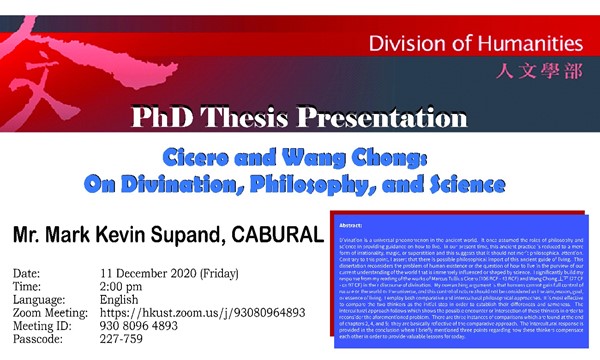Abstract
Divination is a universal phenomenon in the ancient world. It once assumed the roles of philosophy and science in providing guidance on how to live. In our present time, this ancient practice is reduced to a mere form of irrationality, magic, or superstition and this suggests that it should not merit philosophical attention. Contrary to this point, I assert that there is possible philosophical import of this ancient guide of living. This dissertation reconsiders the problem of human existence or the question of how to live in the purview of our current understanding of the world that is immensely influenced or shaped by science. I significantly build my response from my reading of the works of Marcus Tullius Cicero (106 BCE—43 BCE) and Wang Chong 王充 (27 CE—ca 97 CE) in their discourse of divination. My overarching argument is that humans cannot gain full control of nature or the world or the universe, and this control of nature should not be considered as the aim, reason, goal, or essence of living. I employ both comparative and intercultural philosophical approaches. It is most effective to compare the two thinkers as the initial step in order to establish their differences and sameness. The intercultural approach follows which shows the possible encounter or intersection of these thinkers in order to reconsider the aforementioned problem. There are three instances of comparisons which are found at the end of chapters 2, 4, and 5; they are basically reflective of the comparative approach. The intercultural response is provided in the conclusion where I briefly mentioned three points regarding how these thinkers compensate each other in order to provide valuable lessons for today.
https://engage.ust.hk/event/6625210
huma@ust.hk
